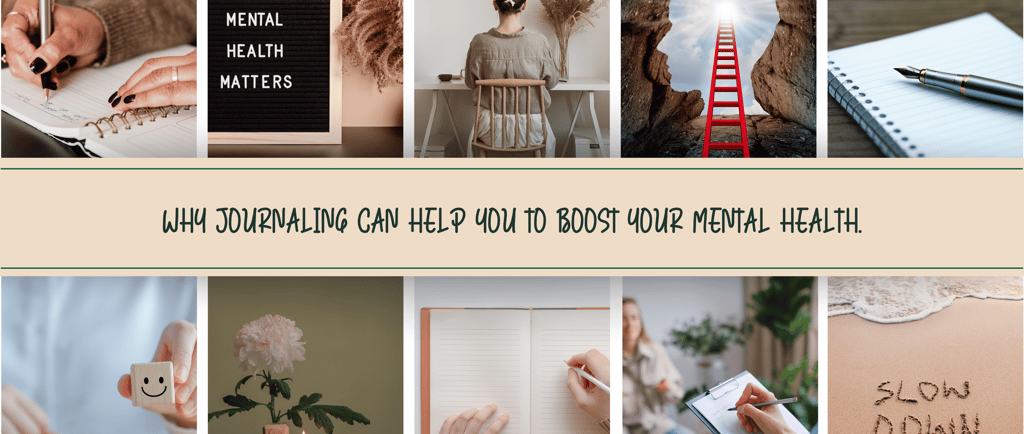Why Journaling Can Help You to Boost Your Mental Health
Learn how journaling helps to improve your mental health.
MENTAL HEALTHJOURNALINGSELF-IMPROVEMENT
Why journaling can help you to boost your mental health.
Nowadays, it can seem like there are just so many constraints on what will help us develop a good mental state with how busy our lives have become. You might consider your options to boost your mental health only to find that talking to other people about sensitive topics is not your thing or you don’t have time to go join group activities that you enjoy or therapy is too expensive. This will leave you wanting to find a cheap and easy way to boost your mental health. Luckily for you, journaling exists. It's cheap in that you only need a journal and a pen and also doesn’t take up a whole lot of time; in fact, you could spend as much time as you need to journal, ranging from only 20 minutes to hours on end if you like. But is journaling a good enough tool to boost your mental health? Let’s find out together…
We can look to research in order to find out if journaling will really be beneficial for mental health. In general, research does suggest that journaling is significantly good at boosting mental health. A study (Işık & Ergüner-Tekinalp) in 2017 found that journaling helped college students adapt to college life more effectively, be more satisfied with their lives, and have more positive affect, which basically means more good emotions. More research adds to this by showing us that journaling about good things in life can help reduce mental distress and boost wellbeing. It was also found to help reduce depressive symptoms. It should be noted that this study looked at people with a wide range of medical conditions and elevated anxiety symptoms.
Journaling about good things might be fine, but what if there aren’t many good things, or in fact, things going on in your life at all? Will journaling still be helpful? And the answer to that is yes. Kozoil (2021) found journaling to be helpful across a variety of different settings, and even alongside therapy, this study used a combination of surveys and interviews to gather information (i.e., mixed methods), which adds to its value. Even more recent research complements this by suggesting that journaling is a low-risk tool that can help improve mental health if implemented correctly (Sohal et al., 2022).
However, there are caveats to this. The main one being that journaling is a resource that needs coaching, education, and practice in order to be effective. As well as this, Ullrich & Lutgendorf (2002) noted that people who wrote down their thoughts as well as their feelings as opposed to just feelings in their journal, were more likely to see the positives in their stressful event, or, in other words, be more optimistic. Being optimistic is linked to being more resilient (Gómez Molinero et al., 2018), which means you can better cope with challenges and combat mental health trouble.
Realising that journaling properly will help you boost your mental health, you might feel unsure about how you’re supposed to journal correctly. Even though just writing things down will help, you might want to make the most of your time journaling, and this is where guided journals are great. Guided journals provide prompts and ideas to help you get started with your journaling, making it easier for beginners. You don’t need to get training on how and what to write about. You can just follow the prompts and be on your way to helping your mental health in the simplest way possible.
As with everything, no research is perfect and definitive, and neither am I, so please feel free to read the papers yourself and make an informed judgement. If you have any comments or constructive criticism, feel free to leave them below or message us on our socials.
Don’t know where to look for and find a guided journal for yourself? Look no further than the website on which you are probably reading this right now. Newbee Publication has a few for you to choose from, alongside many other books that will help you to keep your headspace clear this year.
- Anuj Yadav (BSc Psychology graduate)
References
David, S. A. (2016). Emotional agility: Get unstuck, embrace change, and thrive in work and life. Penguin.
Gómez Molinero, R., Zayas García, A., Ruiz González, P., & Guil, R. (2018). Optimism and resilience among university students. International Journal of Developmental and Educational Psychology. https://doi.org/10.17060/ijodaep.2018.n1.v1.1179
Işık, Ş., & Ergüner-Tekinalp, B. (2017). The effects of gratitude journaling on Turkish first-year college students’ college adjustment, life satisfaction, and positive affect. International Journal for the Advancement of Counselling, 39, 164-175. https://doi.org/10.1007/s10447-017-9289-8
Kozoil, C. (2021). Journaling’s impact on mental health. UWL Journal of Undergraduate Research, 24, 1-9. https://www.uwlax.edu/globalassets/offices-services/urc/jur-online/pdf/2021/koziol.callie.eng.pdf
Pennebaker, J. W. (1997). Writing about emotional experiences as a therapeutic process. Psychological Science, 8(3), 162-166.
Seligman, M. E. P. (2011). Flourish: A visionary new understanding of happiness and well-being. Free Press.
Smyth, J. M., Johnson, J. A., Auer, B. J., Lehman, E., Talamo, G., & Sciamanna, C. N. (2018). Online positive affect journaling in the improvement of mental distress and well-being in general medical patients with elevated anxiety symptoms: A preliminary randomized controlled trial. JMIR Mental Health, 5(4), e11290. https://doi.org/10.2196/11290
Sohal, M., Singh, P., Dhillon, B. S., & Gill, H. S. (2022). Efficacy of journaling in the management of mental illness: a systematic review and meta-analysis. Family Medicine and Community Health, 10(1). https://doi.org/10.1136/fmch-2021-001154
Ullrich, P. M., & Lutgendorf, S. K. (2002). Journaling about stressful events: Effects of cognitive processing and emotional expression. Annals of Behavioral Medicine, 24(3), 244-250. https://doi.org/10.1207/S15324796ABM2403_10








"Journaling helps individuals gain clarity on their emotions and develop emotional agility by allowing them to explore and understand their feelings."
- Dr Susan David (2016)
"Cultivating optimism through practices like journaling can contribute to greater resilience in the face of life's challenges."
- Dr. Martin Seligman (2011)
"Expressive writing in a journal can serve as a form of emotional processing. It allows individuals to make sense of their experiences and can lead to improved mental health"
- Dr. James Pennebaker (1997)
